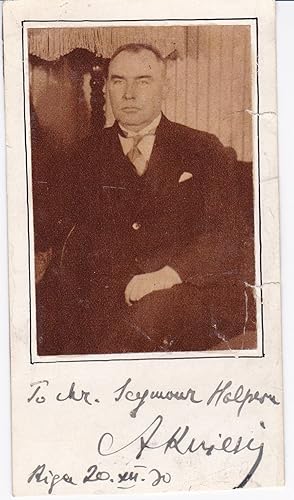kviesis alberts latvian lawyer politician (1 Ergebnisse)
Produktart
- Alle Produktarten
- Bücher (1)
- Magazine & Zeitschriften
- Comics
- Noten
- Kunst, Grafik & Poster
- Fotografien
- Karten
-
Manuskripte &
Papierantiquitäten
Zustand
- Alle
- Neu
- Antiquarisch/Gebraucht
Einband
- alle Einbände
- Hardcover
- Softcover
Weitere Eigenschaften
- Erstausgabe
- Signiert
- Schutzumschlag
- Angebotsfoto
- Kein Print-on-Demand
Land des Verkäufers
Verkäuferbewertung
-
MAGAZINE PORTRAIT OF THE THIRD PRESIDENT OF LATVIA ALBERTS KVIESIS, INSCRIBED AND SIGNED BY HIM.
Verlag: Riga, Latvia: December 20, 1930., 1930
Anbieter: Blue Mountain Books & Manuscripts, Ltd., Cadyville, NY, USA
Signiert
Zustand: Good. - A 3 inch high by 2 inch wide sepia-toned portrait of Alberts Kviesis is mounted on a slightly larger piece of card. Inscribed & signed on the mount below the photo: "To Mr. Seymour Halpern / A. Kviesis / Riga. 20.XII.30". The photo is slightly rubbed with short tears. It has been varnished for protection. Good. Latvian lawyer and politician Alberts Kviesis [1881-1944) served as President of Latvia from April 1930 to April 1936. He was a singularly ineffective president, never proposing or vetoing a law or calling an extraordinary cabinet meeting. Elected nonetheless to a second term, a coup d'etat seems to have passed him by almost unnoticed. He made no protest but continued to exercise his duties, though without any real power, until the end of his term. During the Soviet army's occupation of Latvia in the early 1940s, he hid with his family and evaded the mass deportations. Under the German occupation he returned to his work as a lawyer and collaborated with the Germans. The Queens, New York Republican Congressman Seymour Halpern (1913-1997) started his political career as a campaign aide to New York's powerful mayor Fiorella La Guardia and first served in New York's State Senate for 14 years before seeking a seat in the U.S. Congress. In Albany Halpern sponsored 279 bills that became law, including measures on schools, housing, civil rights, nutrition and mental health. A Liberal, he was something of an anomaly as the lone Republican representative from New York City, and generally garnered support from Labor Unions and endorsement from the Liberal Party. Yet he never even considered switching parties as he considered membership in the Republican Party a family tradition and commitment. While he found ample time for his private pursuits, including painting and collecting autographs, he took his legislative duties very seriously. Of these, he was proudest of his co-sponsorship of the 1964 Civil Rights Act and of the original 1965 Medicare legislation.


